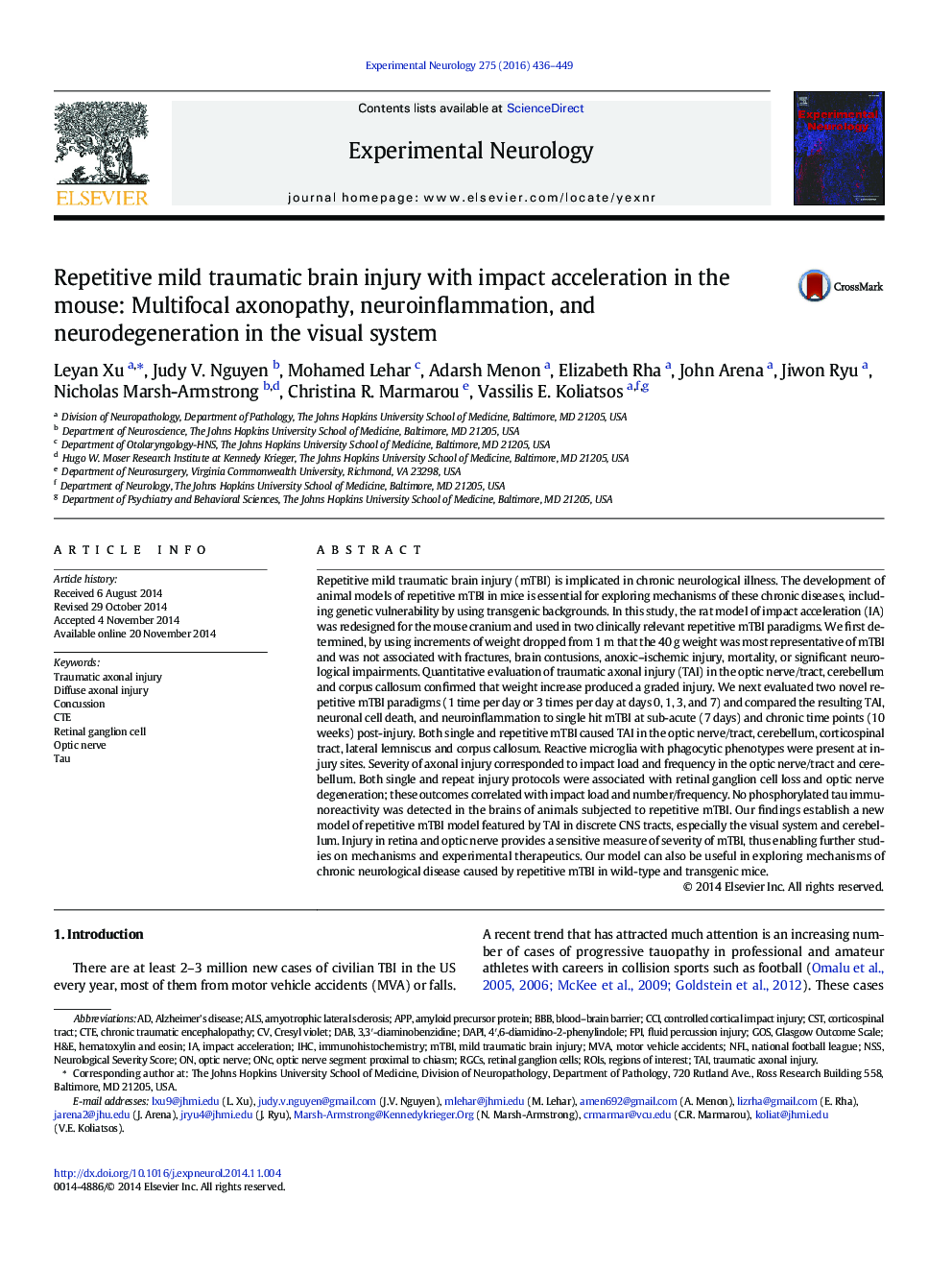| کد مقاله | کد نشریه | سال انتشار | مقاله انگلیسی | نسخه تمام متن |
|---|---|---|---|---|
| 6017106 | 1186477 | 2016 | 14 صفحه PDF | دانلود رایگان |
عنوان انگلیسی مقاله ISI
Repetitive mild traumatic brain injury with impact acceleration in the mouse: Multifocal axonopathy, neuroinflammation, and neurodegeneration in the visual system
ترجمه فارسی عنوان
آسیب مغزی آسیب دیده تکراری با شتاب ضربه در ماوس: آکنوپاتی چند نفره، نوروپاتولوژی و نوروژنز در سیستم بینایی
دانلود مقاله + سفارش ترجمه
دانلود مقاله ISI انگلیسی
رایگان برای ایرانیان
کلمات کلیدی
NSSONCDABmTBICCICTENFLAPPGOSDAPI3,3′-diaminobenzidine - 3،3'-diaminobenzidine4′,6-diamidino-2-phenylindole - 4 '، 6-دیامیدینو-2-فنیلینولCSt - CSTH&E - H & EFPI - REITControlled cortical impact injury - آسیب تحت تاثیر قرار میگیردFluid percussion injury - آسیب سیاتیکMild traumatic brain injury - آسیب مغزی آسیبدیده خفیفamyotrophic lateral sclerosis - اسکلروز جانبی آمیوتروفیکchronic traumatic encephalopathy - انسفالوپاتی مزمن ترومایتیIHC - ایمونوهیستوشیمیImmunohistochemistry - ایمونوهیستوشیمیAlzheimer's disease - بیماری آلزایمرALS - بیماری اسکلروز جانبی آمیوتروفیکMotor vehicle accidents - تصادفات موتور خودروcorticospinal tract - دستگاه گوارشBBB - سد خونی مغزیBlood–brain barrier - سد خونی مغزیimpact acceleration - شتاب ضربهOptic nerve - عصب بیناییnational football league - لیگ ملی فوتبالMVA - مالیات بر ارزش افزودهGlasgow Outcome Scale - مقیاس نتیجه گلاسکوneurological severity score - نمره شدت نورولوژیکHematoxylin and Eosin - هماتوکسیلین و ائوزینamyloid precursor protein - پروتئین پیش ماده آمیلوئیCresyl violet - کریسیل بنفش
موضوعات مرتبط
علوم زیستی و بیوفناوری
علم عصب شناسی
عصب شناسی
چکیده انگلیسی
Repetitive mild traumatic brain injury (mTBI) is implicated in chronic neurological illness. The development of animal models of repetitive mTBI in mice is essential for exploring mechanisms of these chronic diseases, including genetic vulnerability by using transgenic backgrounds. In this study, the rat model of impact acceleration (IA) was redesigned for the mouse cranium and used in two clinically relevant repetitive mTBI paradigms. We first determined, by using increments of weight dropped from 1Â m that the 40Â g weight was most representative of mTBI and was not associated with fractures, brain contusions, anoxic-ischemic injury, mortality, or significant neurological impairments. Quantitative evaluation of traumatic axonal injury (TAI) in the optic nerve/tract, cerebellum and corpus callosum confirmed that weight increase produced a graded injury. We next evaluated two novel repetitive mTBI paradigms (1 time per day or 3 times per day at days 0, 1, 3, and 7) and compared the resulting TAI, neuronal cell death, and neuroinflammation to single hit mTBI at sub-acute (7Â days) and chronic time points (10Â weeks) post-injury. Both single and repetitive mTBI caused TAI in the optic nerve/tract, cerebellum, corticospinal tract, lateral lemniscus and corpus callosum. Reactive microglia with phagocytic phenotypes were present at injury sites. Severity of axonal injury corresponded to impact load and frequency in the optic nerve/tract and cerebellum. Both single and repeat injury protocols were associated with retinal ganglion cell loss and optic nerve degeneration; these outcomes correlated with impact load and number/frequency. No phosphorylated tau immunoreactivity was detected in the brains of animals subjected to repetitive mTBI. Our findings establish a new model of repetitive mTBI model featured by TAI in discrete CNS tracts, especially the visual system and cerebellum. Injury in retina and optic nerve provides a sensitive measure of severity of mTBI, thus enabling further studies on mechanisms and experimental therapeutics. Our model can also be useful in exploring mechanisms of chronic neurological disease caused by repetitive mTBI in wild-type and transgenic mice.
ناشر
Database: Elsevier - ScienceDirect (ساینس دایرکت)
Journal: Experimental Neurology - Volume 275, Part 3, January 2016, Pages 436-449
Journal: Experimental Neurology - Volume 275, Part 3, January 2016, Pages 436-449
نویسندگان
Leyan Xu, Judy V. Nguyen, Mohamed Lehar, Adarsh Menon, Elizabeth Rha, John Arena, Jiwon Ryu, Nicholas Marsh-Armstrong, Christina R. Marmarou, Vassilis E. Koliatsos,
